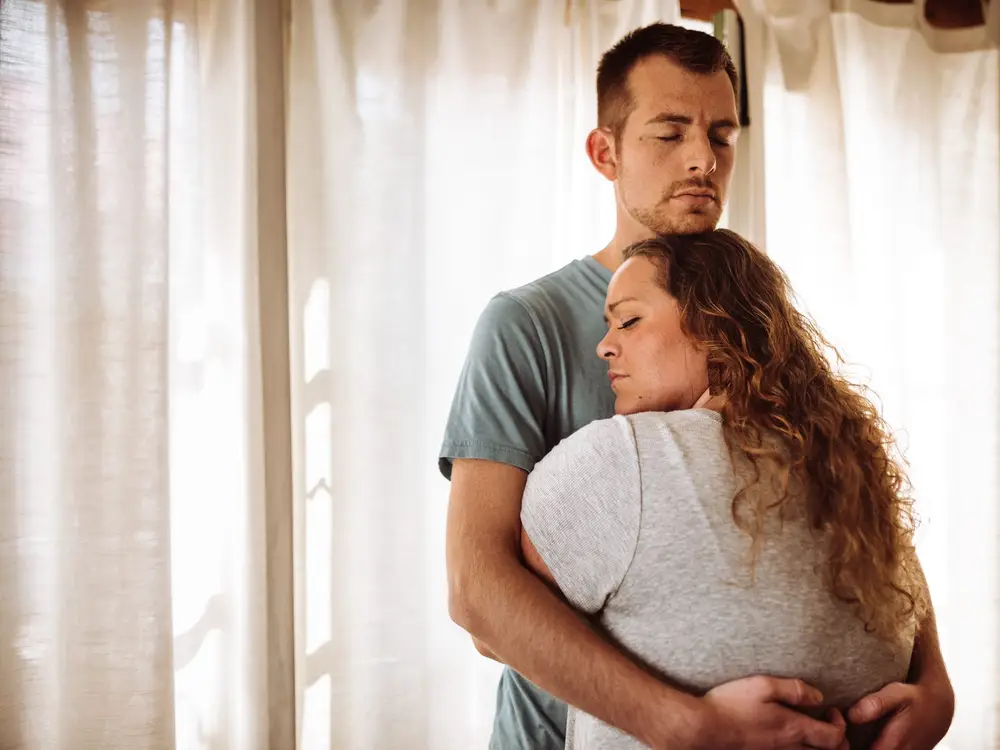Infertility has taken a toll on my marriage. IVF hasn’t brought us a baby, but it has helped me fall more in love with my husband.

The author, not pictured, leans on her husband for support during IVF treatment.
Over a year ago, my husband and I learned that we would need to undergo in vitro fertilization (IVF) to have a biological child.
I figured it wouldn’t be too difficult. I imagined it would be a couple of weeks of hormone injections followed by an egg retrieval. I also imagined there would be a short period during which we’d wait for the sperm to fertilize the egg, and then — voilà — I would be pregnant.
But that’s not what happened. Then it didn’t happen again. And again.
My IVF journey has been anything but easy. Thankfully, I’ve had my husband by my side the whole way.
IVF is an exhausting process
First, there are the hormone injections that left me bloated and bruised. Not only did they disrupt hormones, but they completely disrupted entire days. The first shot of the day needs to be taken at the same time every morning, so even though it is Saturday, I am rubbing an alcohol wipe over my lower abdomen at 7 in the morning, prepping for the injection. Evening shots must also be administered at the same time every day, so on many nights, I found myself sitting in traffic panicking because I wasn’t sure I would make it home in time for my two shots at 8 p.m.
There are also frequent morning monitoring appointments at the fertility clinic, where I began my days with bloodwork and a transvaginal ultrasound. Every cycle culminates in a major procedure: egg retrieval.
After which, I waited anxiously by the phone for nurses to update me on the results. (11 retrieved, 5 mature, 4 fertilized, 1 made it.) When the phone rang, I braced myself for bad news. (We found a cyst on your ovary. Your body is not responding to the hormones. None of your eggs were mature. Your embryo didn’t survive.)
Nothing prepares you for the overwhelming grief of losing something that was never really yours, but being able to share that grief with my husband created a new level of intimacy in our relationship.
IVF hasn’t brought us a baby, but it brought our relationship to a deeper level
Though infertility can be lonely and isolating, my husband and I found it to be a common ground where we learned how to show up for one another fully. We’ve had to ask ourselves and each other very difficult questions about what our relationship would look like if we weren’t able to have a child, which has led to some of our deepest, most honest conversations.
I learned his grieving process, and he learned mine. Over time, I knew when to give him space, and he knew when just to listen.
To say that infertility has taken a toll on my husband and me emotionally, physically, and mentally is an understatement. But after every failed IVF cycle, my husband continues to reassure me that the beautiful life we already had was enough for him.
As I was lying in a hospital bed in the pre-op area before my third egg retrieval, my husband slid the light blue medical shoe cover over my socked foot. When he looked up at me and smiled, I felt an overwhelming tenderness toward him. The same feeling swelled in my chest when I watched him arrange pillows on the sofa before administering the evening shots, and every time, I found little notes on the coffee pot that read, “I am so proud of you.”
As he pulled the thin blanket up to my chest and kissed my forehead, it occurred to me that somewhere along the way — during the early morning wake-ups, hormonal migraines, and bill statements — I had fallen deeper in love with my husband.
Although many unknowns mark our lives, we have never been more certain of each other and our relationship. Infertility doesn’t define us, but it has helped to define what matters most: knowing we are going to fully support one another through all of life’s challenges.






